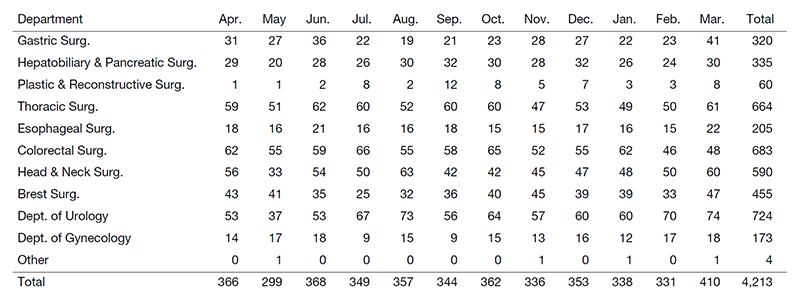Annual Report 2020
Surgical Center
R.Hayashi, W. Kitazawa
Introduction
The 12 operating rooms at the surgical center are used by 10 surgical departments. As our main strategy is less invasive and function-preserving surgery, we conduct more thoracoscopic and laparoscopic surgeries than other hospitals. The Indication for robot-assisted surgery has been expanding year by year. We increase medical safety through good communication between anesthesiologists, nurses, doctors and other medical staff members.
The Team and What We Do
A total of 4,213 surgical operations were performed in the last fiscal year, a record high (Table 1).
Robot-assisted surgery was newly adopted by the Gynecology, Urology, Gastric Surgery, Thoracic Surgery, and Esophageal Surgery departments, bringing the total number of robotic-assisted procedures performed to 362.
The Department of Thoracic Surgery has newly adopted totally endoscopic surgery, and additional autologous lung transplantations have been performed since last year. The Department of Hepatobiliary and Pancreatic Surgery has performed difficult laparoscopic procedures, including distal pancreatectomy and pancreaticoduodenectomy. The number of taTME procedures performed for rectal cancer is also increasing in the Department of Colorectal Surgery.
Table 1. Total number of operations

Education
We have established a cross-departmental education system for training surgical residents. In particular, we provide systematic and efficient education in endoscopic surgery. This year, due to the spread of COVID-19, the opportunities for technical training for visitors and residents from home and abroad have been reduced compared with previous years. However, our physicians can make use of our robot technology and continue their training, allowing them to improve their skills without being affected by social situations.
For our nurses, we have worked to strengthen cooperation with the ICU, with a view toward the future development of operating room nursing. Training sessions in ICU operations for operating room nurses and training in operating room procedures for ICU nurses have been launched and are held regularly.
We expect an increasing number of clinical studies in surgery and the introduction of an increasing number of advanced new medical technologies, in addition to the expected continuous growth in the number of surgical operations performed. We consider it essential to partner with not only physicians and nurses but also other professionals to continue our efforts to train healthcare professionals with an eye toward the next generation of healthcare.
